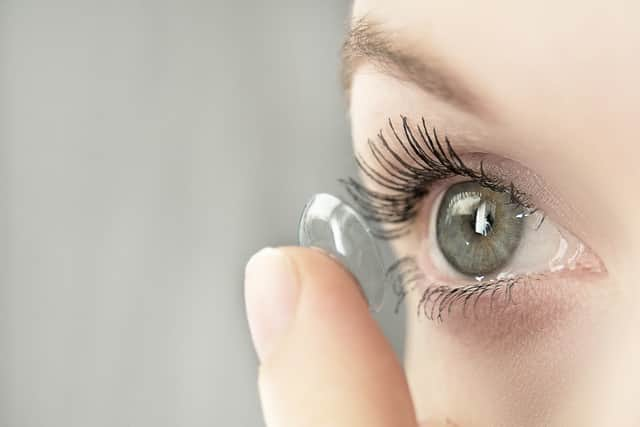Soft contact lenses found to contain toxic ‘forever chemicals’ that can cause health issues, study finds
and live on Freeview channel 276
Popular soft contact lenses have been found to contain toxic ‘forever chemicals’ that can cause serious health issues, according to a recent study.
Scientists tested 18 sets of American soft contact lenses, including brands such as Acuvue, Alcon and CooperVision, and found indications of per-and polyfluoroalkyl substances (PFAS). PFAS are pollutants that do not naturally break down and can stay in the environment for several years.
Advertisement
Hide AdAdvertisement
Hide AdThe research carried out by Mamavation, an eco-wellness product investigation community, along with Environmental Health News, said all of the popular contact lens products that were sent off for tests came back with various levels of organic fluorine which is a marker for PFAS.
Tests found that 44% of the contact lenses contained more than 4,000 parts per million of organic fluorine.
Researchers also found that all of the contacts exceeded 100 parts per million (ppm) of organic fluorine, which is about 50,000 times more than the highest level that’s considered safe in drinking water by the Environmental Protection Agency (EPA).


According to Mamavation, exposure to PFAS could cause lowered immunity, increased cholesterol levels, metabolic diseases like obesity and diabetes, cardiovascular disease, lowered fertility in men and women, increased risk of kidney and testicular cancers, and other side effects.
Advertisement
Hide AdAdvertisement
Hide AdMamavation, which investigates food and consumer products, says it is “imperative to reduce the amount of PFAS you are exposed to from food, water and personal care products such as eye contacts”.
Linda S. Birnbaum, Former Director of the National Institute of Environmental Health Sciences and National Toxicology Program at Duke University, North Carolina University and Yale University said it is “concerning” to “ see the presence of organic fluorine as “your eyes are one of the most sensitive parts of your body.”
She added: “What about the idea of doing no harm? Do we have proof these products are safe? A lack of safety studies does not qualify as ‘safety,’ which is what is happening here.”
According to the Centers for Disease Control, more than 45 million Americans wear contact lenses and of these 90% use soft and disposable contact lenses.
Advertisement
Hide AdAdvertisement
Hide AdChief scientist of Environmental Health Sciences Pete Myers also told Fox News he was concerned by the findings.
He said: “Last summer, the EPA issued health advisories in drinking water for four common PFAS, ranging from 0.004 parts per trillion (ppt) to 2000 ppt. The EPA considers exposure beneath these thresholds to be safe for drinking water.
“It’s worth noting that all the contact lenses tested exceeded 100ppm, which is equivalent to 100,000,000 ppt or 50,000 times higher than the highest level deemed safe in drinking water by the EPA.”
However, holistic optometrist Dr Marc Grossman said he was not as alarmed by the test results as in his 43 years of practice he has “not found that individuals who wear contact lenses are affected by eye diseases more than those who do not.”
He added: “Because each lens manufacturer uses different materials, these studies do not clearly state if there are contact lenses that contain fewer chemicals than others.”
Comment Guidelines
National World encourages reader discussion on our stories. User feedback, insights and back-and-forth exchanges add a rich layer of context to reporting. Please review our Community Guidelines before commenting.
